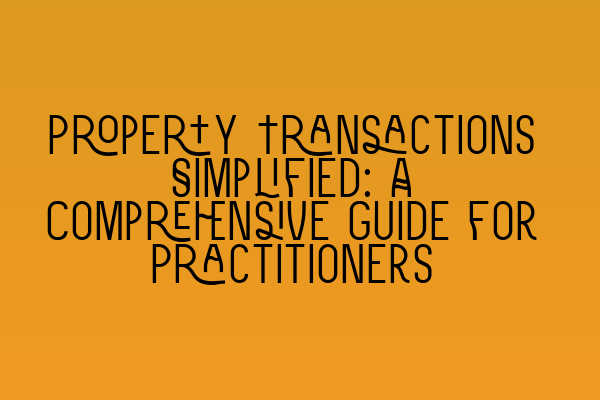Property Transactions Simplified: A Comprehensive Guide for Practitioners
Welcome to our comprehensive guide on property transactions for practitioners. This guide aims to simplify the complex world of property law and provide valuable insights to solicitors and professionals in the field. Whether you’re a seasoned practitioner or just starting out, this guide will help you navigate through property transactions with ease.
1. Understanding Property Law
Before diving into property transactions, it is crucial to have a solid understanding of property law. Our SQE 1 Preparation Courses can assist you in mastering the fundamental principles of property law, covering topics such as freehold, leasehold, co-ownership, and more.
2. Types of Property Transactions
There are various types of property transactions, each with its own specific requirements and considerations. Our guide covers the essentials, including residential conveyancing, commercial property transactions, lease extensions, and leaseholds. Gain a comprehensive understanding of the intricacies of each transaction and ensure your clients receive the best advice.
3. Key Steps in Property Transactions
Executing a successful property transaction requires careful planning and attention to detail. Our guide outlines the key steps involved, from initial client instructions and property searches to exchange of contracts and completion. By following these steps diligently, you can minimize the risk of errors and deliver a smooth experience for your clients.
4. Handling Challenges and Pitfalls
Property transactions can sometimes encounter challenges and pitfalls that may disrupt the process. Stay ahead of the game by learning how to handle common issues such as title defects, boundary disputes, and environmental concerns. Our guide provides practical tips and strategies to address these challenges effectively.
5. Post-Transaction Obligations
Your responsibilities as a practitioner extend beyond the completion of a property transaction. Understand the post-transaction obligations, such as Stamp Duty Land Tax (SDLT) compliance, registration of title, and dealing with ongoing property management matters. Enhance your knowledge and ensure your clients remain fully compliant.
6. Staying Up-to-Date with the SQE Exams
As a property law practitioner, it is essential to stay informed about the latest developments and changes in the legal profession. Our SRA SQE Exam Dates article provides valuable insights into the upcoming exam schedules, enabling you to plan your study and professional development effectively. Additionally, you can test your knowledge with our SQE 1 Practice Exam Questions and SQE 1 Practice Mocks FLK1 FLK2.
Conclusion
Property transactions can be complex, but with the right knowledge and guidance, you can excel in this area of law. By understanding property law, familiarizing yourself with different transaction types, following key steps diligently, and staying informed about post-transaction obligations and SQE exams, you can provide exceptional service to your clients.
At SQE Property Law & Land Law, we offer comprehensive SQE 2 Preparation Courses to further enhance your expertise in property transactions. Stay updated, expand your knowledge, and advance your career in property law today!
